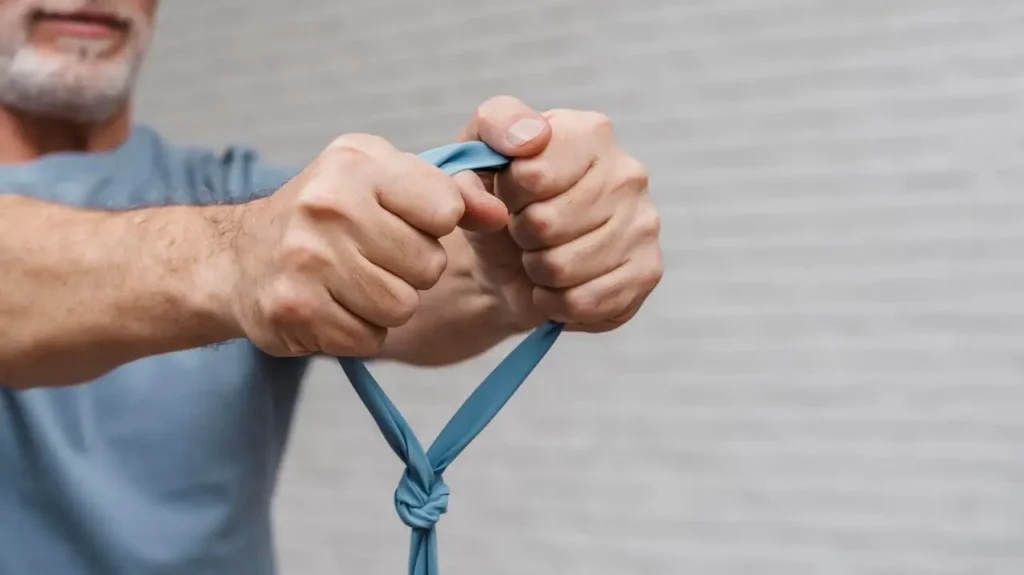Vestibular Therapy
What is Vestibular Therapy?

Vestibular therapy is a type of physical therapy that helps people with dizziness, balance problems, and vertigo. It focuses on retraining the brain and body to adjust to changes or disruptions in the inner ear, which controls balance. This kind of treatment can include vestibular therapy exercises for vertigo that improve coordination, stability, and motion tolerance, helping with symptoms like spinning sensations or unsteadiness. With time, vestibular therapy can help people feel more steady.
Conditions Treated with Vestibular Therapy
Vestibular physical therapy can help with much more than just occasional dizziness. It’s used to treat a wide range of issues that affect balance, coordination, and movement. This therapy offers special support to help the body adapt and regain stability. Physical therapy for vertigo is often part of recovery after illness, injury, or neurological changes. It can even help with anxiety caused by disorientation or loss of balance.
Benign paroxysmal positional vertigo (BPPV) is one of the most common causes of spinning sensations or dizziness. It happens when tiny crystals in the inner ear move into places they shouldn’t be, disrupting your sense of balance. Vestibular physical therapy helps by using specific head and body movements to guide those crystals back where they belong. This can reduce or stop the dizziness and help your body feel more stable again. Treatment is safe, simple, and often brings fast relief.
Meniere’s disease happens when fluid builds up in the inner ear, leading to a mix of symptoms like ringing in the ears (tinnitus), sudden dizzy spells, and sometimes even temporary hearing loss. These episodes can come without warning and last for hours. Vestibular rehabilitation therapy helps by training your brain and body to handle the balance changes better. With special exercises and movement training, your symptoms can become easier to manage.
Vestibular neuritis is an infection that affects the inner ear, leading to sudden dizziness or vertigo. It can make you feel off balance or like the room is spinning, especially when you move your head. Vestibular rehabilitation therapy helps by retraining your brain to adapt to the changes in balance signals. Through simple physical therapy exercises for vertigo patients can return to normal daily activities more comfortably.
Migraines can sometimes affect your balance, causing dizziness or vertigo. These episodes might also come with painful light or sound sensitivity and vision changes. Vestibular therapy exercises can help by improving how your brain processes balance and movement signals. Through specific exercises, patients can fight dizziness and feel more stable, even during or after migraine. Physical therapy for vertigo is especially helpful for people who experience frequent migraine-related balance issues.
After a stroke, your ability to balance and move properly can be affected. Some people experience ongoing dizziness or vertigo as the brain heals. Vestibular rehab therapy helps by retraining your brain and body to work together again. Through specific exercises and movement training, patients can improve coordination, reduce dizziness, and feel steadier on their feet again. Vertigo physical therapy helps with recovery and can help stroke survivors feel more comfortable in their daily life.
Symptoms of Vestibular Dysfunction

- Vertigo. Vertigo is a spinning sensation, like the room is moving even though you’re standing still. It can happen suddenly and make it hard to walk or even stand. People often feel off-balance or like they’re tilting or swaying.
- Personalized Plan. Based on the assessment, they will create a treatment plan based on your needs.
- Dizziness. Dizziness is a general feeling of being lightheaded or unsteady. It may not feel like full vertigo, but it can still make daily life harder, especially when standing up or moving around quickly.
- Falls. Frequent stumbling or losing balance can be a sign of vestibular problems. When the brain and inner ear aren’t communicating well, it becomes harder to stay steady.
- Nausea. Many people with vestibular dysfunction experience nausea, especially if the dizziness or vertigo episodes are intense. It may feel similar to motion sickness and can come with vomiting in more severe cases.
- Gaze Instability. This means your vision feels shaky or blurry when your head moves. You might notice it when walking, reading, or turning your head quickly – your eyes have trouble keeping things in focus.
- Feeling of Faintness. Some people feel like they might faint or “black out,” especially when standing up. This can be related to blood pressure changes, but vestibular dysfunction can also trigger that.
Benefits of Vestibular Therapy
Vestibular therapy for vertigo is designed to help people who struggle with balance, dizziness, or motion-related issues. One of the biggest benefits is better balance, which makes walking, standing, and daily tasks feel more comfortable. It also helps reduce feelings of spinning or lightheadedness by teaching your brain how to adapt to movement. As your balance and coordination improve, your risk of falling goes down. Vertigo vestibular therapy can also provide clearer vision while moving and feel more comfortable about daily activities. Vestibular therapy for vertigo can help with faster recovery and make you feel more comfortable in daily life.

Schedule a consultation here to find out!
Vestibular Therapy at Copper Wellness in Chicago, IL

At Copper Wellness in Chicago, IL, we offer vertigo vestibular therapy as part of our care approach. If you’re struggling with dizziness, balance issues, or motion sensitivity, our team can help you retrain your brain to feel more stable again. As an integrative health center, we use various proven methods to help you, like physical therapy services, chiropractor services, and acupuncture therapy under one roof, making your care easier. Whether your vertigo is recent or you’ve been suffering from it for a long time, we take time to understand your unique symptoms and help you with gentle, effective methods and treatments.
Ready to feel steady again? Book your appointment today at Copper Wellness.
Reviews About Vestibular Therapy
I am moving from Chicago soon and truly going to miss this amazing clinic.
From the beginning, I was clear that billing transparency was important to me. Despite that, I ran into repeated issues with billing. The clinic charged me estimated amounts that didn’t ultimately match my Explanation of Benefits (EOB) from UnitedHealthcare, and when I brought up the discrepancies—with actual documentation to back it up—I was met with defensiveness rather than a willingness to resolve things collaboratively.
One particularly strange policy I encountered was that this clinic might charge a “clinic fee” if UnitedHealthcare doesn’t accommodate their cash rates. This seems to blur the lines between in-network and out-of-network billing.
Meanwhile, claims weren’t submitted to insurance promptly, which delayed payments and caused unnecessary confusion—none of which was my fault as the patient.
Bottom line: I paid what I was invoiced on time, asked reasonable questions when things didn’t add up, and was made to feel like I was the problem for doing so. I’ve since paused services until this can be sorted out—and I feel compelled to share my experience here.
Our Insurance Partners
We accept most major insurance plans depending on your type of service.





FAQs About Vestibular Therapy
Does Vestibular Therapy Really Work?
Yes, vestibular therapy is proven to help reduce dizziness, improve balance, and restore stability for people with inner ear or neurological conditions. At Copper Wellness in Chicago, IL, we provide personalized vestibular physical therapy and vestibular rehabilitation therapy to treat symptoms like vertigo, unsteadiness, and motion sensitivity. Through targeted exercises and balance training, our approach helps retrain the brain and vestibular system to respond more effectively to movement.
How Does Vestibular Therapy Work?
Vestibular therapy works by using specific exercises to help your brain adapt to balance issues, reduce dizziness, and improve coordination. At Copper Wellness in Chicago, IL, we offer personalized vestibular rehab therapy that includes eye movement training, balance exercises, and head motion techniques to retrain the vestibular system. This approach is especially effective as vestibular therapy for vertigo, helping patients overcome spinning sensations, regain stability, and feel more confident in daily movement.
What Is Vestibular Therapy for Vertigo?
Vestibular therapy for vertigo is a specialized form of physical therapy that uses targeted exercises to reduce dizziness, improve balance, and retrain the brain’s response to motion. At Copper Wellness in Chicago, IL, our therapists design customized physical therapy exercises for vertigo, such as gaze stabilization, balance training, and head movement techniques. These help patients regain stability and confidence by addressing the root cause of their vertigo symptoms.
How Long Does Vestibular Therapy Take?
Vestibular therapy usually takes several weeks to a few months, depending on the cause and severity of your symptoms. At Copper Wellness in Chicago, IL, our personalized vestibular physical therapy programs are designed to help you make steady progress. Most patients begin to notice improvements in balance and dizziness after just a few sessions, with full vestibular therapy plans typically lasting 6–12 visits for lasting results.
What Happens During Vestibular Therapy?
During vestibular therapy, patients perform targeted exercises that improve balance, reduce dizziness, and help the brain adapt to movement-related challenges. At Copper Wellness in Chicago, IL, our vestibular physical therapy sessions may include eye tracking, head and body movements, balance training, and walking exercises. These techniques are designed to retrain the vestibular system and reduce symptoms caused by vertigo, inner ear disorders, or neurological conditions. Each vestibular therapy plan is tailored to your specific diagnosis and progress.
What Is Physical Therapy for Vertigo?
Physical therapy for vertigo is a targeted treatment that uses exercises and manual techniques to reduce dizziness and improve balance. At Copper Wellness in Chicago, IL, we offer personalized physical therapy vertigo treatment plans that retrain your vestibular system through eye movement exercises, head positioning, and balance training. This approach helps your brain adapt to motion signals, easing vertigo symptoms and restoring confidence in everyday movement.
Contact Information
Learn more about our clinic and doctors and why they are trusted by so many families in our community.
Tue - Thu: 9AM - 8PM
Fri: 9AM - 6PM
Sat: 9AM - 4PM